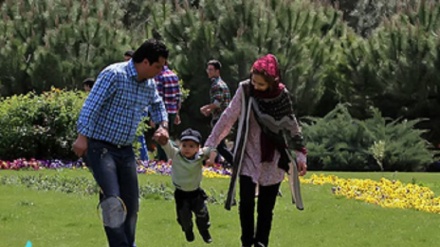Iranian Family (28)
Welcome to this week's episode of the series "Iranian Family". Many researchers, in their studies, have named maintenance of religious beliefs as one of the effective contributors to establishment of a successful family.
The divine religion of Islam notes that family is the first learning center for acquisition of virtues, materialization of values, and growth and development of talents and capacities. So, home provides a safe territory within which piety and humane characteristics are shaped, leading the individual toward prosperity. Family is founded on principles such as kindness, forgiveness, virtuous interactions, mutual respect and honor. In fact, family provides the best shelter and safest environment for mankind.
Last week, we spoke of the features of a religious family and named some of the characteristic traits of a successful and appropriate family. Around 81% of the studies which have been carried out by researchers point out that religious practices positively impact and reinforce the relationships among family members.
According to a renowned Western psychology professor, there are significant evidences, which indicate religious beliefs leave numerous positive impacts on families. These beneficial outcomes include reinforcement of health, education, earnings, chastity, sustainability of marriage, alleviation of crime rate and drug abuse cases, promotion of mental health and happiness and self-esteem, solidarity of family members, and improvement of general health.
Currently, social thinkers are contemplating and pondering over the constant power of religion for supporting the family against forces that lead to breakdown of families.
According to a body of global reliable studies, the worst pessimism is usually observed among students which do not attend religious ceremonies. In the meantime, the students who took part in religious ceremonies, once a week, or several times every week, were more optimistic about their future, and considered the world as an amicable living environment, which contributed to their success.
The fact of the matter is that maintenance of religious beliefs grants meaning to life, and alleviates hardships. It can be said that the key hurdle to durability of marriage is the crisis of meaning in troubled marriages. Hence, many men and women who have distanced from religious values, have encountered a paradox between their personal freedom and emotional security, which has in turn resulted in hostility between them.
Meanwhile, the divine religion of Islam, based on its comprehensive outlook, considers morality and ethical virtues as superior values and makes utmost efforts to encourage families to adopt ethical virtues. The individuals who are brought up based on this outlook, never feel defeated due to failure in acquisition of worldly values, such as material comfort.
One of the other evident personal impacts of religious beliefs, is reinforcement of patience. Religious individuals, while making efforts to meet financial needs, and to establish a prosperous family, do not fall into despair in case of facing poverty, or familial differences of opinion, and set their hopes on divine pledges.
Religious individuals believe that God is constantly observing their deeds; thereby avoiding any possible misdeeds that would displease God Almighty.
Avoidance of religiously forbidden deeds reinforces familial bonds. In the divine religion of Islam, gossiping and accusing others is prohibited. Hence, members of the family respect one another in each other's absence, and do not expose themselves to disrespect and resentment. Alcoholic drinks are prohibited in the sacred religion of Islam, so spouses and children are safeguarded against any acts of violence and misdeeds. Islam has also forbidden children from disrespecting their parents. hence, a strong emotional bond and support is established and maintained among children and parents.
There are countless other examples, which manifest the positive impacts of religious beliefs on the reinforcement of familial bonds.
Numerous studies have proven that marriage results in physical and mental health, in addition to longevity. Japanese physicians have pointed out that single men are three times more susceptible to cardiovascular illnesses in comparison to married men. Based on a research which was carried out in the year 2011, it was proven that marriage reduces the risk of early death by 11%. Another study carried out by World Health Organization in the year 2010 showed marriage reduces the risk of anxiety and depression.
MR/ME


